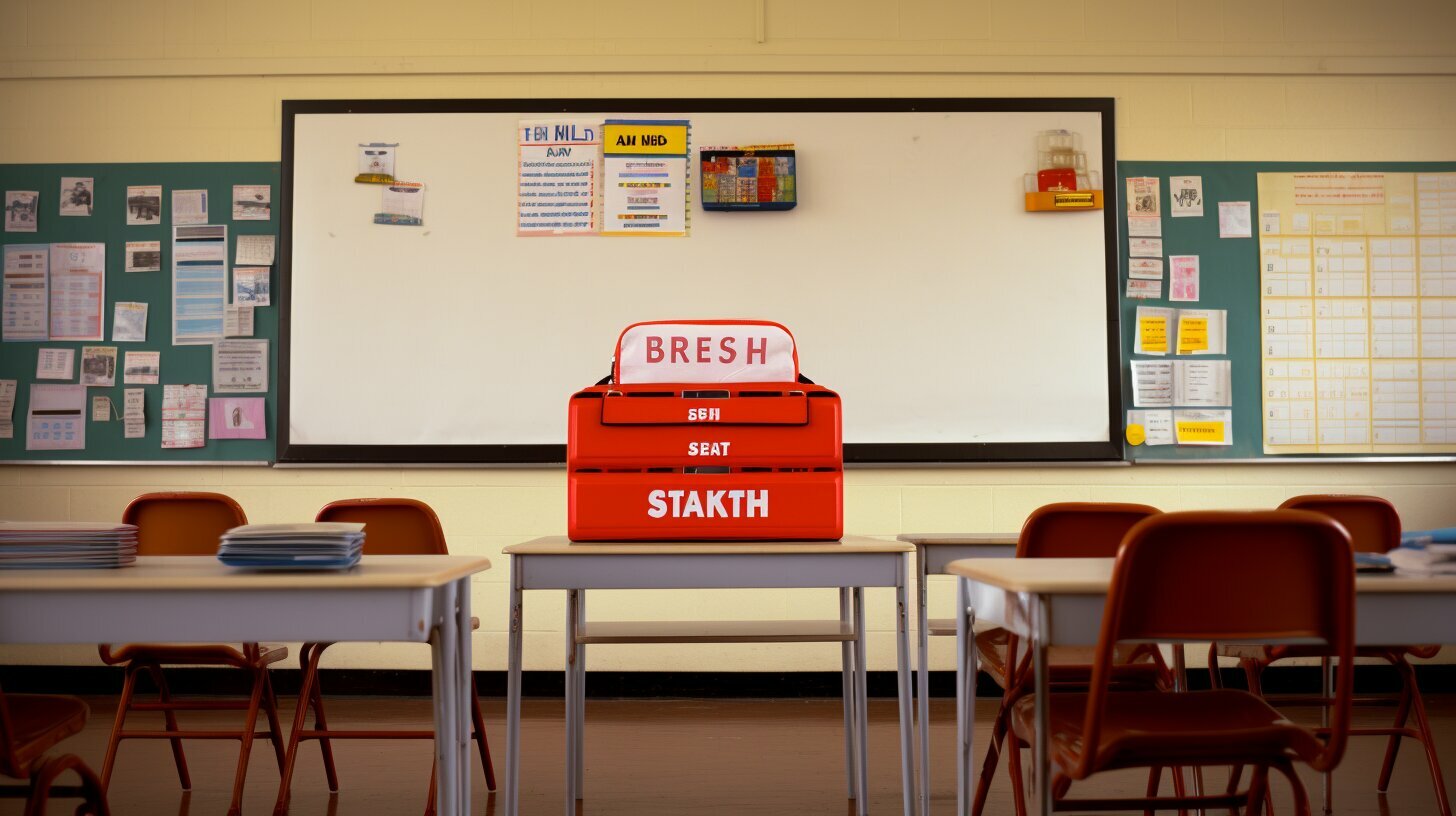First aid kits play a crucial role in ensuring the safety and well-being of students in UK schools, safeguarding the future generations of our nation. These kits are a vital resource that can make a significant difference in emergency situations, providing immediate assistance until professional medical help arrives. By having properly stocked first aid kits readily available, schools can effectively manage injuries and potentially save lives.
When it comes to the safety of our future generations, it is essential to prioritize comprehensive safety measures in schools. The British Red Cross, in collaboration with the University of Manchester, is advocating for increased first aid education and the inclusion of first aid programs in the curriculum for all children and young people in England. This emphasis on first aid education goes beyond equipping students with life-saving skills; it also enhances their understanding of health matters and empowers them to care for themselves and others.
In a study conducted by the University of Manchester, it was found that up to 59% of deaths from injuries could be prevented if timely first aid intervention was provided before emergency medical services arrived. These findings highlight the crucial role that first aid plays in preventing injuries and saving lives. By teaching students basic first aid techniques and promoting emergency preparedness, schools can contribute to a safer and more prepared society.
Furthermore, first aid education can help alleviate the strain on emergency departments. Often, individuals visit accident and emergency departments due to a lack of knowledge about what to do in an emergency. By equipping students with first aid skills, unnecessary visits to A&E can be reduced, allowing medical professionals to focus on more severe cases. The British Red Cross advocates for mandatory first aid education in all UK schools to ensure that every student has the necessary knowledge to respond effectively in emergency situations.
Additionally, the British Red Cross recommends that businesses, including schools, consider switching to eco-friendly first aid kits. Traditional kits often have an environmental impact, so adopting sustainable alternatives can contribute to a greener future. Evaluating the first aid needs specific to each school or college and appointing designated first aiders or individuals responsible for first aid arrangements are also essential to maintain a safe learning environment.
As the British Red Cross calls for more opportunities for people to learn first aid throughout their lives, it is evident that first aid education has a lasting impact on community safety. By equipping future generations with the skills and knowledge to respond effectively in emergencies, we can ensure the safety and well-being of our nation’s future. Safeguarding our future starts with comprehensive first aid measures in UK schools.
The Importance of First Aid Education
In addition to first aid kits, providing comprehensive first aid education in schools is essential for enhancing school safety and empowering students with the necessary skills to respond effectively in emergencies. First aid education equips children and young people with life-saving skills, enabling them to provide immediate assistance until professional help arrives. It also improves their understanding of health issues and fosters a sense of responsibility towards their own well-being and that of others.
A study conducted by the University of Manchester found that up to 59% of deaths from injuries could be prevented if first aid was performed before emergency medical services arrived. This highlights the critical role that first aid education plays in saving lives. By ensuring that students are equipped with the knowledge and skills needed to respond swiftly and appropriately in emergencies, schools have the potential to create a safer environment for their students.
First aid education also helps relieve the pressure on emergency departments by minimizing the number of non-emergency visits to hospitals. Many individuals seek medical attention due to a lack of knowledge on how to handle minor injuries and illnesses. By teaching first aid skills, schools can empower students to take care of themselves and others, reducing the burden on healthcare facilities.
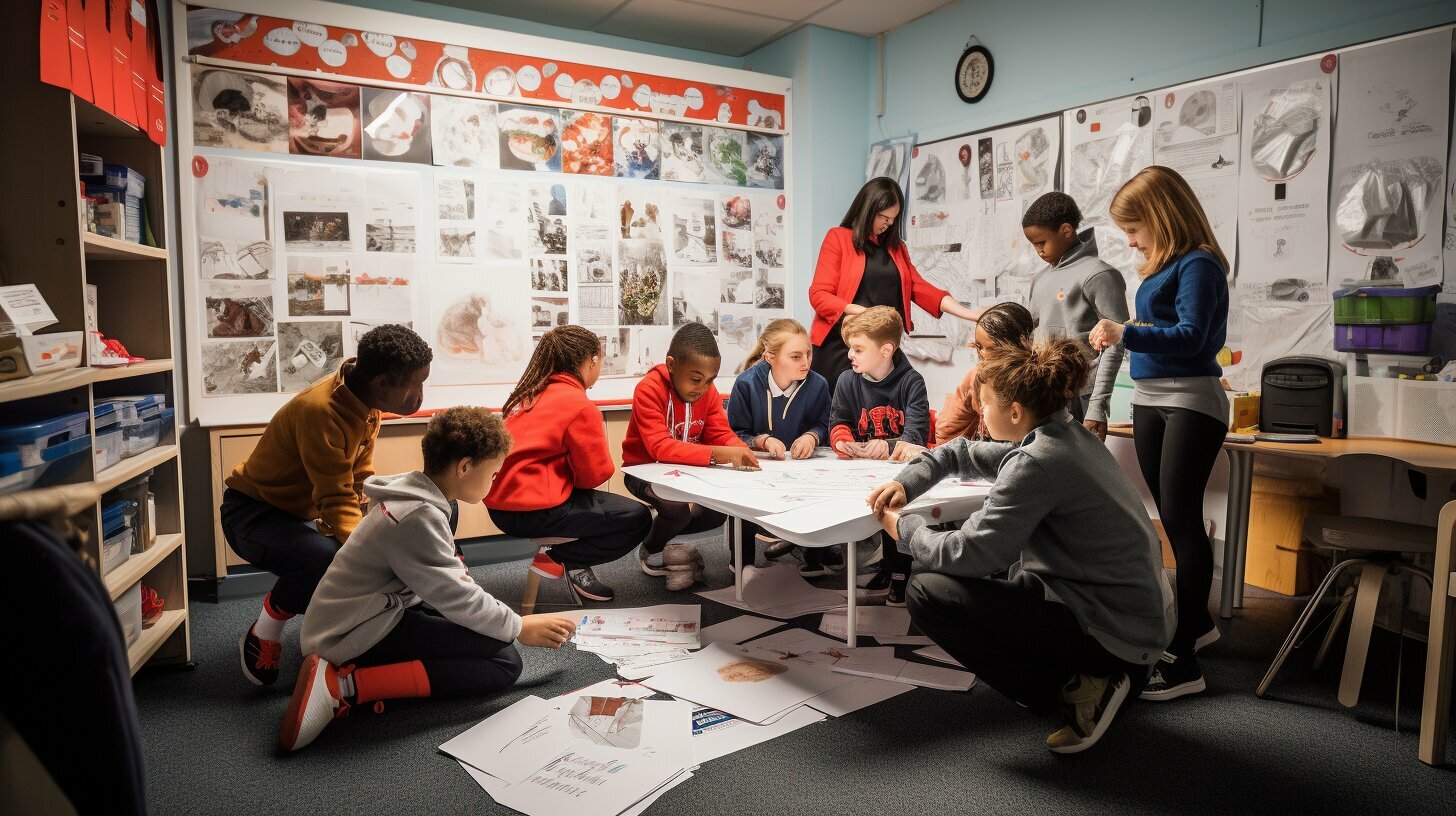
The British Red Cross recommends that first aid education should be mandatory in all UK schools. By integrating first aid education into the curriculum, schools can ensure that every child receives the necessary training to respond effectively in emergency situations. Additionally, businesses, including schools, are encouraged to switch to eco-friendly first aid kits to reduce their environmental impact and contribute to sustainability efforts.
Key Points:
- First aid education enhances school safety and empowers students with life-saving skills.
- Up to 59% of deaths from injuries can be prevented through timely first aid intervention.
- Teaching first aid in schools reduces non-emergency visits to hospitals.
- Mandatory first aid education in schools and the use of eco-friendly first aid kits are recommended.
Table: Comparison of First Aid Education Approaches
| Approach | Advantages |
|---|---|
| Integration into the curriculum | Ensures all students receive training |
| Optional extracurricular classes | Allows interested students to deepen their skills |
| Partnership with local first aid organizations | Provides expert guidance and resources |
The Role of First Aid in Preventing Injuries
Timely application of first aid techniques can significantly reduce the severity and prevent complications arising from injuries, emphasizing the importance of adequate first aid training and emergency preparedness in schools. When accidents occur, having individuals trained in first aid on-site can make all the difference in providing immediate care before professional medical help arrives. A study conducted by the University of Manchester found that up to 59% of deaths from injuries could be prevented if first aid was performed before emergency medical services arrived. This highlights the critical role that first aid plays in saving lives and preventing further harm.
First aid training equips individuals with the knowledge and skills to assess injuries, administer appropriate care, and stabilize a person’s condition until professional medical help is available. It empowers individuals to take prompt action in emergencies, whether it be providing CPR, controlling bleeding, or immobilizing fractures. By learning first aid, children and young people not only gain life-saving skills but also develop a greater understanding of health matters, fostering a culture of safety and preparedness.
By implementing comprehensive first aid training programs in schools, students become more aware of potential hazards and how to respond effectively. First aid education can instill confidence in handling emergencies, reducing panic and improving overall safety in schools and communities. Furthermore, first aid training can help alleviate the strain on emergency departments, as individuals equipped with first aid skills are better able to assess situations and provide immediate care, reducing the need for unnecessary visits to A&E.
To ensure the safety of future generations, it is crucial that first aid education is made mandatory in all UK schools. This would ensure that every student receives comprehensive training in life-saving techniques and emergency preparedness. Additionally, businesses, including schools, should consider switching to eco-friendly first aid kits to reduce their environmental impact. The British Red Cross recommends conducting first aid needs assessments and appointing designated first aiders or individuals responsible for first aid arrangements in schools and colleges to ensure adequate first aid provision.
Image:
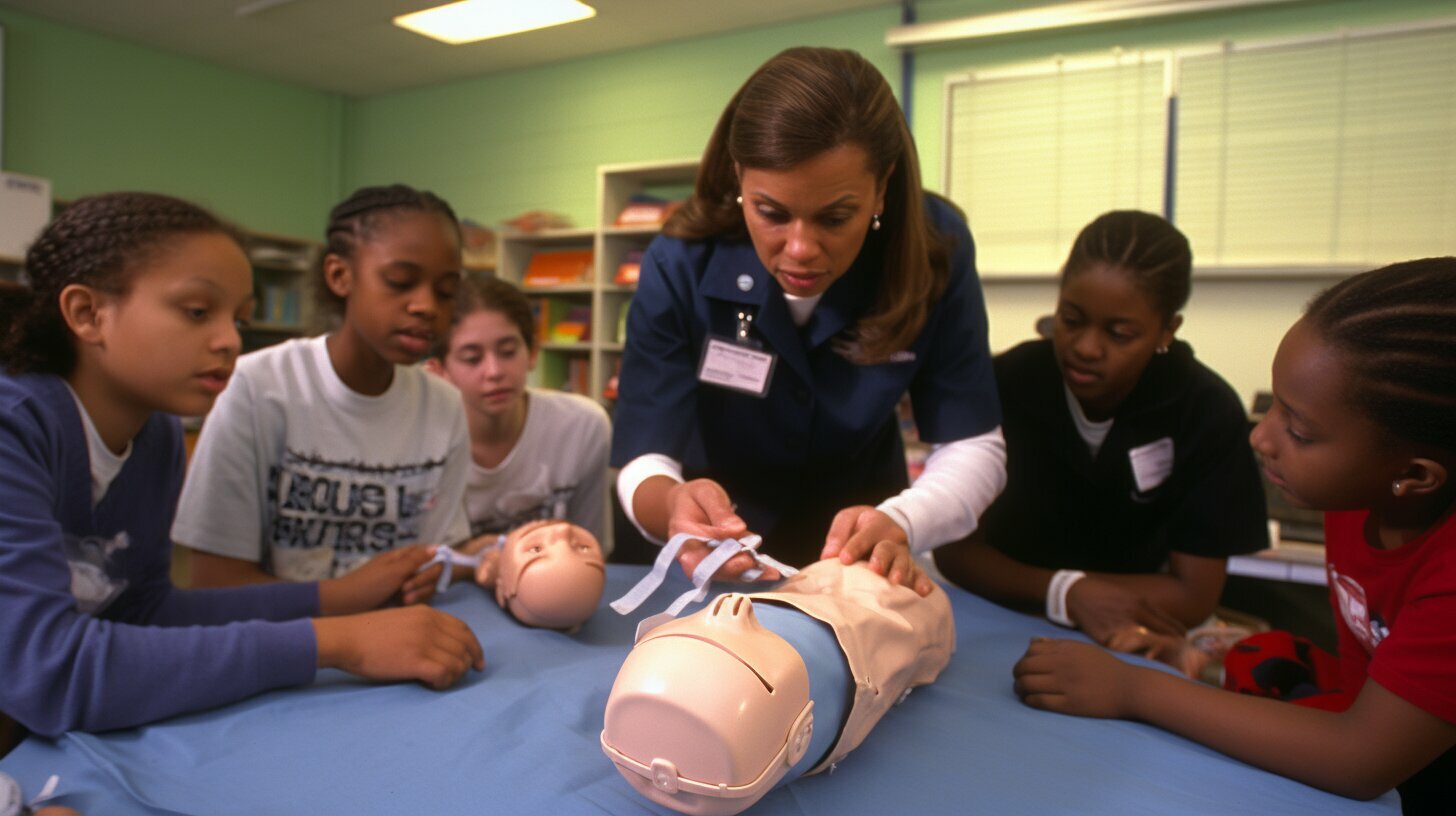
| Benefits of First Aid Education | Benefits of Integrating First Aid in Schools |
|---|---|
|
|
Integration of First Aid Education in the Curriculum
To ensure the safety and well-being of our future generations, it is imperative that first aid education becomes an integral part of the curriculum for children and young people throughout England. By equipping students with the knowledge and skills to respond effectively in emergency situations, we can empower them to take charge of their own well-being and the well-being of others.
First aid education goes beyond teaching basic first aid techniques; it also enhances children’s understanding of health issues and fosters a sense of responsibility towards their own health and the health of their communities. By including first aid education in the curriculum, we are promoting a culture of safety and care, where individuals are equipped to handle emergencies and take immediate action when needed.
The British Red Cross recommends that first aid education be mandatory in all UK schools. This ensures that all children and young people have the opportunity to learn these life-saving skills from an early age. By implementing this recommendation, we can create a generation of individuals who are prepared to respond confidently and effectively in emergency situations, ultimately saving lives.
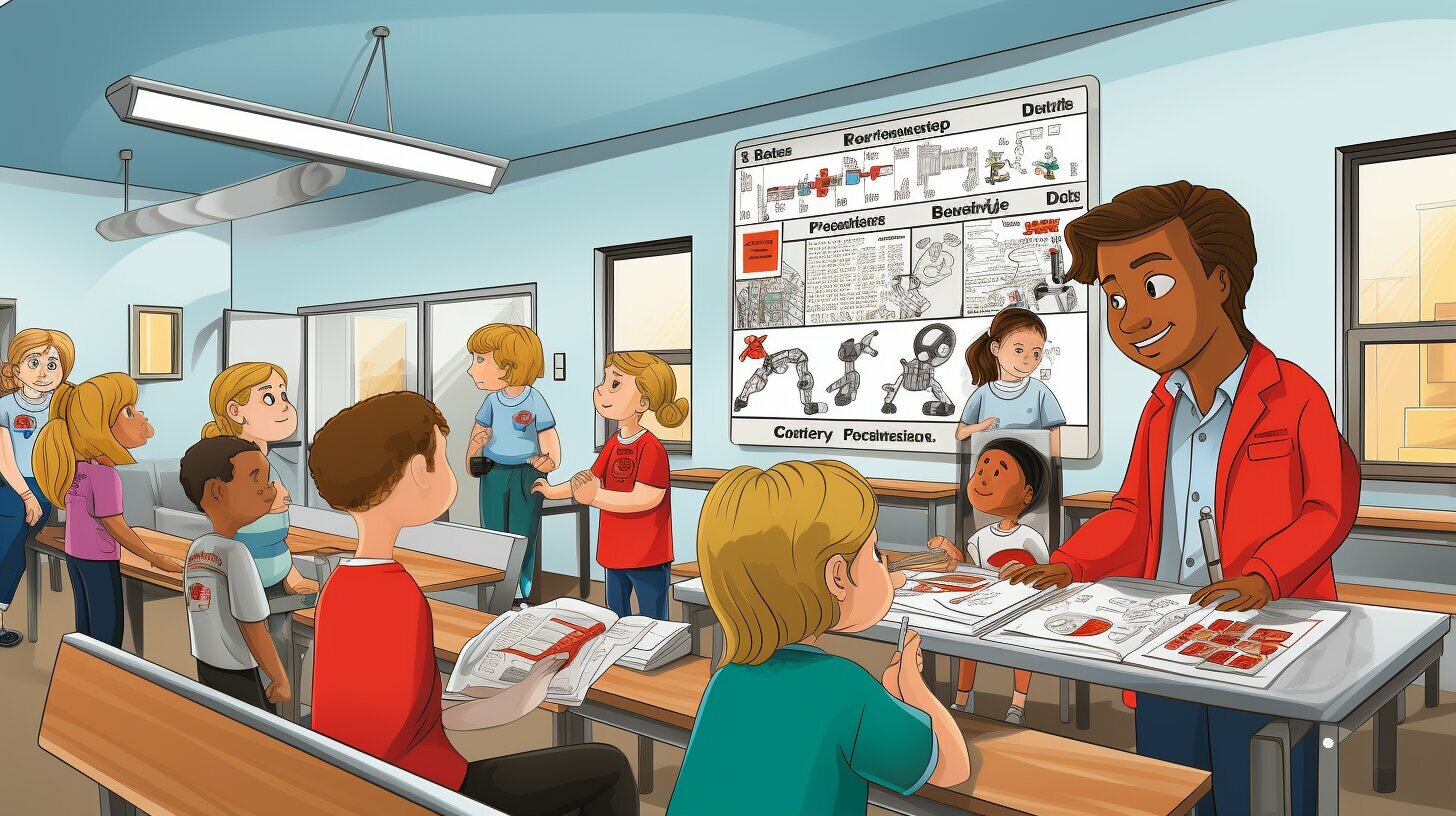
- Empowers students to take charge of their own well-being and that of others.
- Enhances students’ understanding of health issues and the importance of preventive measures.
- Equips students with life-saving skills that can be applied in emergency situations.
- Instills a culture of safety and care in schools and communities.
- Prepares future generations to handle emergencies with confidence and efficiency.
By integrating first aid education into the curriculum, we are investing in the safety and well-being of our future generations. It is essential that all children and young people have access to this vital knowledge and are prepared to respond effectively in times of crisis. Let us come together and advocate for the inclusion of first aid education in the curriculum, ensuring that our children and young people are equipped with the skills to save lives.
| First Aid Education in the Curriculum | Key Benefits |
|---|---|
| Empowers students to take charge of their own well-being and that of others. | Enhances students’ understanding of health issues and the importance of preventive measures. |
| Equips students with life-saving skills that can be applied in emergency situations. | Instills a culture of safety and care in schools and communities. |
| Prepares future generations to handle emergencies with confidence and efficiency. |
Relieving Pressure on Emergency Departments
By providing comprehensive first aid education to students, we can help reduce the burden on emergency departments, as individuals will be better equipped to handle emergencies and seek appropriate medical assistance when needed. A lack of knowledge about first aid often leads to unnecessary visits to A&E, with individuals unsure of how to respond in an emergency situation.
According to a study conducted by the University of Manchester, up to 59% of deaths from injuries could be prevented if first aid was performed before emergency medical services arrived. This highlights the crucial role that timely first aid intervention can play in saving lives and preventing further complications.
By incorporating first aid education into the school curriculum, we can empower children and young people with life-saving skills and knowledge. They will not only be able to respond effectively to emergencies but also develop a better understanding of health matters and how to care for themselves and others.

Furthermore, first aid education can help alleviate the strain on emergency departments by reducing the number of unnecessary visits. Individuals who have received proper training will be able to provide immediate care and support, reducing the need for emergency medical services in non-life-threatening situations. This allows healthcare professionals to focus on more critical cases and ensures that resources are utilized efficiently.
| Benefits of Comprehensive First Aid Education |
|---|
| Empowers individuals to respond effectively in emergencies |
| Enhances overall understanding of health matters |
| Reduces unnecessary visits to A&E |
| Alleviates the strain on emergency departments |
In conclusion, by prioritizing first aid education in schools and communities, we can contribute to the overall safety and well-being of our society. Equipping individuals with life-saving skills and knowledge not only benefits them personally but also relieves pressure on emergency departments and promotes efficient use of healthcare resources. It is essential to recognize the significance of first aid education and work towards making it a mandatory component of the curriculum for all students, ensuring that future generations are prepared to handle emergencies and take care of themselves and others.
Mandatory First Aid Education in UK Schools
In order to ensure the highest standard of safety for students, it is crucial that first aid education becomes a mandatory component of the curriculum in all UK schools. The British Red Cross, along with other leading organizations, is advocating for this important change to protect the well-being of future generations. By equipping children and young people with the knowledge and skills necessary to respond effectively in emergency situations, we can empower them to save lives and contribute to a safer society.
First aid education goes beyond teaching basic life-saving techniques. It helps young individuals develop a deeper understanding of health issues and fosters a sense of responsibility towards their own well-being and that of others. By including first aid education in the curriculum, we can create a generation that is not only prepared to handle emergencies but also equipped to prevent injuries from occurring in the first place.
Studies have shown that timely first aid intervention can prevent up to 59% of deaths from injuries before emergency medical services arrive. By making first aid education mandatory in schools, we can ensure that more individuals have the knowledge and confidence to provide immediate assistance when it matters most. This, in turn, can help alleviate the strain on our already overwhelmed emergency departments, as many people seek medical attention due to a lack of knowledge about what to do in an emergency.

To successfully implement mandatory first aid education, schools and colleges should conduct comprehensive first aid needs assessments. These assessments will determine the appropriate level of first aid provision required for each institution. Additionally, designated first aiders or individuals responsible for first aid arrangements should be appointed to oversee the implementation of safety measures.
Benefits of Mandatory First Aid Education:
- Empowers children and young people with life-saving skills
- Improves understanding of health issues and personal well-being
- Reduces the number of preventable injuries and deaths
- Alleviates pressure on emergency departments
- Fosters a sense of responsibility and community care
By making first aid education a mandatory component of the curriculum in all UK schools, we can safeguard the well-being of our future generations. The British Red Cross, alongside various stakeholders, calls on governments and educational institutions to prioritize the implementation of this vital change. Together, we can ensure that every child and young person is equipped with the skills and knowledge needed to respond effectively in emergency situations.
| References |
|---|
| British Red Cross (2021). First aid education in schools [PDF]. Retrieved from [insert URL] |
| University of Manchester (2019). The potential of first aid to reduce deaths from injury [PDF]. Retrieved from [insert URL] |
Switching to Eco-Friendly First Aid Kits
As part of an overall commitment to sustainability, it is recommended that schools and businesses in the UK prioritize the use of eco-friendly first aid kits to reduce their environmental impact. By opting for eco-friendly alternatives, such as biodegradable materials and recyclable packaging, these organizations can contribute to a greener future while still ensuring the safety and well-being of their students, employees, and customers.
Eco-friendly first aid kits are designed to minimize harm to the environment throughout their lifecycle. From the sourcing of materials to the disposal of waste, every aspect of eco-friendly kits is carefully considered to reduce negative environmental impacts. By choosing these kits, schools and businesses can actively reduce their carbon footprint and demonstrate their commitment to sustainable practices.

In addition to their environmental benefits, eco-friendly first aid kits are just as effective and reliable as traditional kits. They contain all the necessary items to provide immediate medical assistance in case of injury or emergency. By making the switch to eco-friendly options, schools and businesses can align their safety measures with their sustainability goals, setting a positive example for future generations.
The Importance of Sustainable Practices
Adopting eco-friendly first aid kits is not only about reducing environmental impact, but also about instilling values of sustainability and responsible consumption in students and employees. By prioritizing sustainable practices, schools and businesses play a crucial role in shaping the mindset and behavior of future generations, promoting a culture of environmental consciousness and stewardship.
| Eco-Friendly First Aid Kits Benefits |
|---|
| Reduces plastic waste |
| Promotes responsible sourcing of materials |
| Minimizes carbon footprint |
| Encourages recycling and waste reduction |
| Creates a culture of sustainability |
By embracing eco-friendly first aid kits, schools and businesses in the UK have the opportunity to make a positive impact on the environment while still ensuring the safety and well-being of their communities. It is a small change that can lead to significant results in safeguarding our future.
First Aid Needs Assessments and Provision
Schools and colleges should prioritize the safety of their students by conducting thorough first aid needs assessments to determine the appropriate provisions required and appointing designated individuals responsible for first aid arrangements. By assessing the specific needs of their premises, educational institutions can ensure that they are well-prepared to handle any medical emergencies that may arise.
During the needs assessment process, schools and colleges should consider factors such as the number of students and staff, the layout of the premises, and the potential risks and hazards present. This information will help determine the quantity and placement of first aid kits, as well as the training requirements for staff members.
Additionally, it is crucial to have designated individuals who are responsible for overseeing first aid arrangements within the school or college. These individuals should receive appropriate training and have a clear understanding of their roles and responsibilities.
Benefits of First Aid Needs Assessments and Provision:
Conducting comprehensive first aid needs assessments and ensuring adequate provision offers several benefits for schools and colleges. These include:
- Improved safety: By having the necessary first aid provisions in place and trained individuals ready to respond, educational institutions can create a safer environment for their students and staff.
- Rapid response: Being well-prepared means that immediate first aid can be administered in case of an emergency, potentially minimizing the severity of injuries and saving lives.
- Compliance with regulations: First aid needs assessments and provisions help educational institutions comply with health and safety regulations, ensuring they meet the necessary legal requirements.
- Peace of mind: Knowing that comprehensive first aid arrangements are in place provides peace of mind to students, staff, and parents, fostering a sense of security within the school or college.
By prioritizing first aid needs assessments and provision, schools and colleges demonstrate their commitment to the well-being of their students and staff, creating a safe and secure learning environment.

The British Red Cross is advocating for greater accessibility to first aid learning opportunities across the UK, recognizing the significant role lifelong learning plays in building a safer and more resilient society. With their call for increased first aid education, the British Red Cross aims to empower individuals of all ages with life-saving skills and knowledge.
Studies have shown that timely first aid intervention can significantly reduce the number of fatalities resulting from injuries. A study conducted by the University of Manchester revealed that up to 59% of deaths from injuries could be prevented if first aid was administered before emergency medical services arrived. By equipping more people with first aid skills, we have the potential to save countless lives.
That’s why the British Red Cross recommends the inclusion of first aid education in the curriculum for all children and young people in England. By integrating first aid into the educational system, we can ensure that future generations are equipped with the necessary skills to care for themselves and others. Additionally, first aid education fosters a greater understanding of health matters, promoting overall well-being.
First aid education not only provides individuals with life-saving skills but also helps alleviate the strain on emergency departments. Many people visit A&E due to a lack of knowledge about what to do in an emergency, resulting in unnecessary pressure on healthcare services. By expanding first aid education, we can empower individuals to respond appropriately in emergencies, reducing the burden on emergency departments and enabling them to focus on the most critical cases.
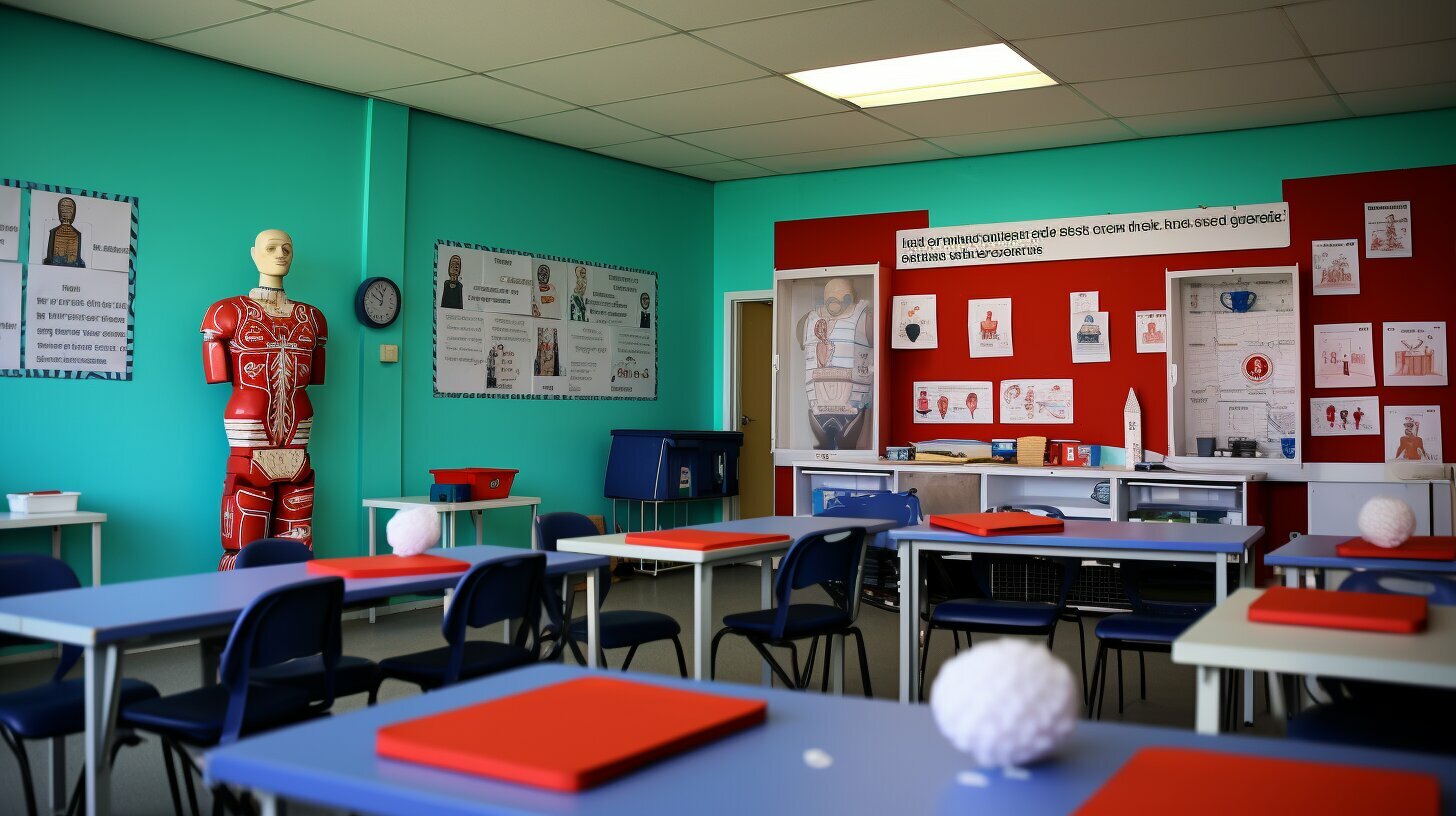
| Benefits of First Aid Education |
|---|
| Empowers individuals with life-saving skills |
| Improves overall understanding of health matters |
| Reduces fatalities resulting from injuries |
| Alleviates strain on emergency departments |
The British Red Cross is committed to promoting first aid education at all levels of society. They urge UK governments to make first aid education mandatory in all schools and encourage businesses, including schools, to switch to eco-friendly first aid kits to minimize their environmental impact. Conducting first aid needs assessments and appointing designated first aiders or individuals responsible for first aid arrangements are also crucial steps in ensuring the safety and well-being of students in schools and colleges.
Ultimately, by embracing first aid education and increasing accessibility to learning opportunities, we can create a society that is better prepared to respond to emergencies, safeguarding the well-being of current and future generations.
The Impact of First Aid Education on Future Generations
By providing comprehensive first aid education to the younger generation, we are investing in a safer future, empowering individuals with the skills and knowledge needed to respond effectively in emergencies. First aid education equips children and young people with life-saving skills, giving them the confidence to act swiftly and appropriately in critical situations. It also improves their overall understanding of health matters, enabling them to make informed decisions about their own well-being.
Studies have shown that up to 59% of deaths from injuries could be prevented if first aid was administered before emergency medical services arrived. This highlights the vital role that first aid plays in preventing avoidable fatalities. By teaching children and young people the basics of first aid, we are creating a generation that is better prepared to save lives and make a difference in their communities.
Furthermore, first aid education can help relieve the strain on emergency departments. Many individuals visit A&E due to a lack of knowledge about what to do in an emergency, leading to unnecessary pressure on healthcare facilities. By equipping people with first aid skills, we can empower them to handle minor injuries and illnesses on their own, reducing the burden on emergency services and ensuring that those in immediate need receive prompt attention.
To ensure the long-term impact of first aid education, it is crucial that it becomes mandatory in all UK schools. By integrating first aid into the curriculum, we can ensure that every child and young person receives this essential training. Additionally, businesses, including schools, should consider switching to eco-friendly first aid kits to reduce their environmental impact and promote sustainability. Employers in educational institutions should conduct first aid needs assessments to determine the appropriate first aid provision for their premises and appoint designated first aiders to take charge of emergency arrangements.
Safeguarding Our Future
The impact of first aid education on future generations cannot be overstated. By equipping young people with the skills and knowledge to respond effectively in emergencies, we are creating a society that is better prepared to handle crisis situations. As first aid education becomes a fundamental part of our school curriculum and businesses adopt eco-friendly practices, we are taking significant steps towards a safer and more sustainable future for all.
| Benefits of First Aid Education | Importance of First Aid Education |
|---|---|
| Empowers individuals to save lives | Enhances overall understanding of health matters |
| Reduces avoidable fatalities | Relieves pressure on emergency departments |
| Promotes confidence and quick response | Ensures prompt attention to those in immediate need |
| Contributes to a safer and more prepared society | Promotes sustainability and eco-friendly practices |

Ensuring the safety of our future generations requires a multi-layered approach, encompassing the provision of first aid kits, comprehensive first aid education, and a commitment to sustainable practices, culminating in a safer and more prepared society.
The British Red Cross, advocating for increased first aid opportunities, recognizes the critical role that first aid plays in preserving lives. A study conducted by the University of Manchester revealed the potential to prevent up to 59% of deaths from injuries through timely first aid intervention. By equipping children and young people with life-saving skills, first aid education not only enhances their understanding of health matters but also empowers them to care for themselves and others.
In addition to the individual benefits, first aid education can alleviate the strain on emergency departments. Many unnecessary visits to A&E result from a lack of knowledge about proper emergency response. By providing individuals with the necessary skills, we can reduce the burden on our healthcare system and ensure that those in need receive timely and appropriate care.
To fully embrace the importance of first aid, the British Red Cross recommends making it mandatory in all UK schools. By integrating first aid education into the curriculum, we can instill life-saving knowledge from a young age, creating a generation that is ready and capable of responding to emergencies. Moreover, businesses, including schools, are encouraged to switch to eco-friendly first aid kits to reduce their environmental impact and contribute to a sustainable future.
Employers in schools and colleges should conduct first aid needs assessments to determine the appropriate first aid provision for their premises. By appointing designated first aiders or individuals responsible for first aid arrangements, we can ensure that swift and effective action is taken in times of crisis.
With the British Red Cross’s call for increased first aid opportunities and the implementation of comprehensive safety measures, such as the provision of first aid kits and education, we can safeguard our future generations. By taking proactive measures, we invest in a society that is prepared, empowered, and capable of minimising harm and saving lives.
